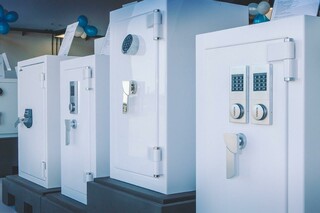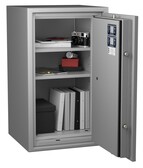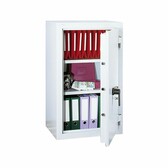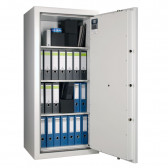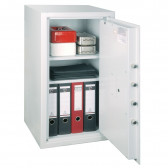The decision to buy a home safe generally comes spontaneously. Perhaps there have been burglaries in the area that you have heard about from friends? Perhaps you yourself have decided to abandon storing cash or valuables in a bank safe deposit box and secure your possessions yourself? Or maybe it's a housekeeping issue and you've decided to finally empty your treasure drawers and have everything in one safe place from now on? Whatever your motivation, the first contact with the subject of safes can be difficult and it is easy to be led astray. In the following paragraphs, we will point out what mistakes should be avoided by customers for whom the subject of safes is completely new.
1. Do not trust the algorithms
For us, an internet search engine is the first step in finding anything, from a Christmas present to a set of winter tyres. We've been used to it for years, most of us carry in our pockets easy and quick access to most of this world's knowledge, and yet we like to take the easy way out, limiting our search to the first few results suggested to us by the algorithm. Let us note, therefore, that the fundamental characteristic of a safe, which is its security class, is only placed by the algorithm in 5th position*. To make matters worse, the only class indicated in the search engine is the unpronounceable "S1", which is ranked lowest in the classification of burglary classes. This is the class that covers the simplest, lightest and by no means secure home appliances. The popularity of the S1 class is due to the industry itself, which largely goes for quantity. In Poland, S1 safes are available in popular DIY stores and, more recently, this is the class required for firearms owners. However, this does not change the fact that, from a physical point of view, these are the weakest safes available on the market, which require neither time nor specialised equipment to open.

2. Do not be fooled by yourself
Over the years, we have observed a phenomenon among our clients that we try to combat and, where possible, dissuade them from rash decisions. Namely, a good number of us have a troublesome trait. We like to tell ourselves that things are good, when they are not. That if we have bought the cheapest insurance, nothing will happen to us, and that if we have a cheap safe at home, our gold bars or ancestral silver are safe. It is a psychological mechanism that assumes that, when faced with a security concern, it is better to do anything than nothing. There are areas of life where this principle may work, but when it comes to securing property it can work exactly the opposite of what we assumed.
So let's imagine that you want to buy a safe. You have some documents at home, some cash, but, most importantly, your grandmother gave you a box of valuables as a gift, and in it is an eagle from a Napoleonic-era cap, your great-grandfather's love letters from the front lines of the First World War, a photograph of your great-grandmother with the date of victory over the Bolsheviks, an original 'High Noon' poster from the 4 June 1989 election or tickets from The Rolling Stones' memorable concert at the Congress Hall in Warsaw. So you make the decision to buy a safe to keep this unique collection secure. Do you lock the priceless items, not even in the financial sense, but one-of-a-kind and unique, in a case that weighs no more than 20 kg and can be pulled out with a crowbar? If you are shaking your head emphatically at this point, know that a large proportion of our customers do just that. They buy the smallest and cheapest safe so that it will be there and draw out their conscience. Meanwhile, such a safe, by itself offering little, will attract the attention of a burglar. And what good is it if there's no gold or cash inside, if the heirlooms can't be recovered?
3. Do not tell anyone
One of the most powerful forces at work in the universe is gossip. Information passed from mouth to mouth, from friend to friend, can turn a mouse into an elephant in a day. It is the same with safes. If you mention to an indiscreet neighbour in the morning that you have a small safe at home for small valuables, by the evening the local burglars will have their eyes on a Scrooge McDuck vault filled to the brim with gold, and this is no exaggeration. The mere presence of a safe in the house sends out the message that here you are, a person whose wealth is large enough to be kept under extra lock and key. A tempting thought. This is why it is insanely important that, apart from your closest and most trusted people, information about the safe, and in particular its weight, security class or type of lock, remains a secret. Burglars, contrary to appearances, are usually professionals who prepare well for their work, observing, questioning, doing a background interview, looking for regularities. Take this into account, both before, during and after the purchase.
One of our fundamental principles is to carry out orders with complete discretion. The safes are packaged in grey cardboard boxes devoid of the company logo, with no indication of the contents. Deliveries to the building are carried out by shipping companies, while the delivery and installation team, like the packaging of the safes, has no markings or logos to suggest what they are bringing in. Unpacking the safe from the cardboard box always takes place within an enclosed space inside the building.
4. Do not make a hasty decision
Buying a safe for home is a decision that must be taken seriously. It is a piece of equipment that will be the keeper of your secrets and the guardian of your treasures for many years to come. You will store there the documents that are most important to you, including those that will be impossible to recreate and whose loss would be a serious problem. There will also be money, jewellery, family heirlooms, etc., which will probably increase in number over the years. In view of this, among the issues that should be considered are:
- the size of the safe – taking into account the increasing number of items and documents over the years;
- security class – if you expect (as we heartily wish) that cash will be increasing, it is worth considering the more promising higher class;
- fire resistance – if your main contents will be documents and money;
- the type of lock – if you are a patient person and you will look into the safe quietly and not more than once a day, a mechanical combination lock may be a good choice. If the safe will be with you more often – definitely an electronic lock;
- place of installation – find a discreet place where the safe will not be conspicuous and will not disturb your space. Make sure there are no pipes or cables preventing the safe from being mounted.
Our experienced, knowledgeable advisers, who have been accompanying our clients for years in choosing the optimal solutions, will help you discuss these issues.
5. Do not decide with your wallet
We leave the least revealing, but also controversial advice for the very end. Taking care of your own wallet is an admirable trait; after all, we support you in protecting your money ourselves by producing safes. As with any other product, be it a smartphone, a car or even a toothbrush, we are all guided in our decision-making process not only by price, but also by brand. A brand that is well-established on the market, with a long tradition, a pan-European operating range or the ability to provide references from other recognised brands is an indication to you as a customer that a supplier of such a critical piece of home equipment as a safe will be a good choice. In our particular case, the final price of the safe is not a simple calculation of production costs and the desire for profit, but the resultant of multi-stage advice, attention to every detail of the transaction, step-by-step accompaniment during the purchasing process and, very importantly, after-sales and post-warranty service in the event of any problems. With the price of the safe in front of you, you are therefore looking not only at the product itself, but at everything else that goes with it.
We further recommend the article in this context: Is it worth buying a safe from a supermarket?
* The search was made for the noun "safe" in Polish.
